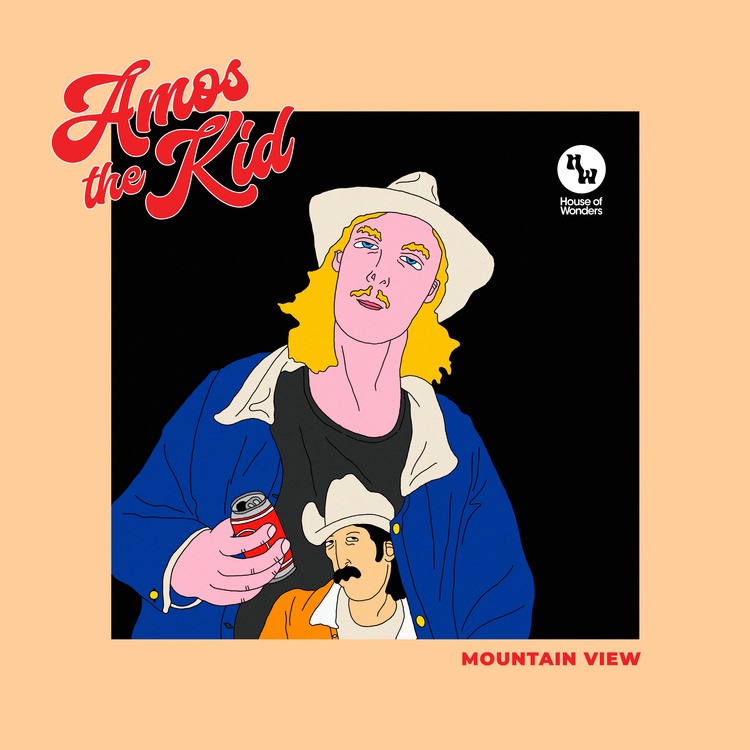
by Margaret Banka
I’ve had an uncanny streak of running into Amos Nadlersmith, namesake of Amos the Kid, in unexpected places, at unexpected times: karaoke at the Sherb (where the median age is fifty); in the Village streets on a late Monday night; during the cold, early morning hours of Harvest Moon, passing around a bag of Old Dutch chips in a tent crammed with five people; emerging from the inevitable cloud of fog after a Smoky Tiger set at Rainbow Trout (okay, that one might have been a hallucination). Wherever it seems to be, Nadlersmith’s familiar presence and easy-going personality ensure that he is never out of place.
Luckily for us, Nadlersmith is able to put all this ubiquity to good work, translating his surroundings into honest and sharp-eyed songwriting. After years of squirrelling material, the newly released EP Mountain View plays like an audio companion to Nadlersmith’s sojourns into city, small town, and rustic milieus. Toted as indie pop, indie rock, or alternative country, Mountain View does not disappoint in its diversity of upbeat, slow, loud, and soft tunes. Tracks range from the catchy, pop-leaning, beer-revelling anthem “What Did You Do” to the gentle, lo-fi lull “Wilderness Treasure”, all of which are anchored by Nadlersmith’s deep, warm vocals and often balanced by Jensen Fridfinnson’s light and airy ones.
Yes, the tracks are catchy, but the defining highlight of Mountain View is Nadlersmith’s demonstrable skill in songwriting through his grasp of subtle language. Uncomplicated lyrics capture the minute moments of life without ignoring the complexities which they adhere to. The five tracks are gracefully coherent, bound with striking sets of binaries: past and present, a religious childhood and jaded adulthood, city and nature, the intimate and the trivial. These contrasts can be measured across the EP and between songs, such as the carefree “What Did You Do” compared to the tender “Pine Grove”. Binaries, however, can also be found threaded through each song. In all its alliterated tongue-in-cheek glory, “Jesus Cocaine Ketamine Christ” is an undeniably crafty collision between nostalgia and sardonic humour: “Church basement casserole / more holy than that bible / and that’s what I learned / in Sunday School”.
The writing is authentic and vulnerable, and is consonant with the instrumentals in each song. In the loudest track, “Mountain View”, heavy guitar and bass help expose the struggle in being caught between religion and non-belief, small town and big city: “And I’ve been sitting here on my own / talking shit about the town from which I’ve grown / and I miss church and I miss God / and I miss the place where I belong”. Meanwhile, softer songs such as “Pine Grove”, “Wilderness Treasure”, and even “Jesus Cocaine Ketamine Christ” have a vintage, lo-fi sound quality to them, mirrored by lyrics that are nostalgic, and longing for a person, place, or time. In fact, you cannot finish this album without feeling the nostalgia that Nadlersmith intended, for which he and the rest of Amos the Kid should be commended.
With seasoned Winnipeg musicians Adam Fuhr, Jordan Cayer, and Brian Gluck also contributing their talent in the instrumentals department, Amos the Kid cultivates a mellow sound that remains consistent despite varying degrees of tempo between songs. Nadlersmith renders to listeners the flashes of humanity that lurk somewhere between maturity and immaturity, reflection and debauchery, concrete and forest, with the effortless humour that one might expect of a tree planter. Living in post-winter X COVID, I think now, more than ever, we are pining for our special place, whether it is a memory or a dream of what’s to come: summer at a lake, the woods, camping, music festivals, or even just a can of Faxe and bicycle debacle on a nice summer evening. Rest assured, listening to Mountain View will let you live out all your nostalgia in the sunniest of ways.

